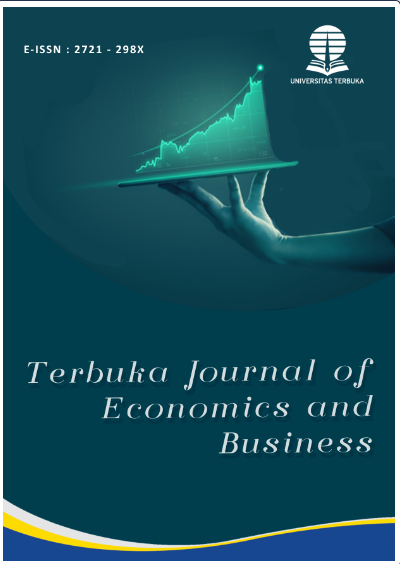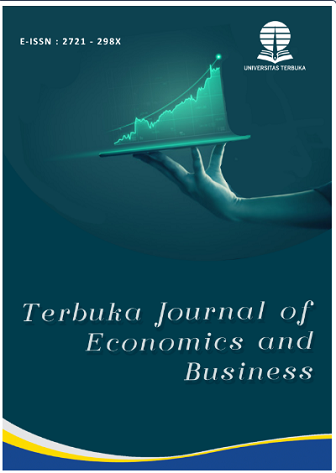Analysis of Factors Affecting Carbon Emissions in Indonesia
Keywords:
Carbon Emissions, Renewable Energy, Coal, OilAbstract
This research aims to examine the variables affecting Indonesia's carbon emissions between 2000 and 2022, with particular emphasis on the consumption of renewable energy sources, coal and oil. Indonesia is the object of this research, and data information is collected from official sources of the World Bank and Our World in Data. The amount of renewable energy, coal, and oil consumed is the independent variable, while carbon emissions are the dependent variable. The research method involves time-series multiple linear regression analysis with statistical testing steps to identify the causal relationship between variables. EViews software was used for statistical testing. Findings show a significant correlation between Indonesia's carbon emissions and the consumption of renewable energy, coal and oil. Strategies to expand the use of renewable energy to reduce carbon emissions are the main focus of the policy implications. This research provides a foundation for sustainable policy development to address Indonesia's carbon emission problem. Pro-renewable and anti-fossil policy recommendations need to be considered to achieve the sustainable goal of reducing carbon emissions and dealing with climate change in Indonesia.
References
Alkhathlan, K., & Javid, M. (2015). Carbon emissions and oil consumption in Saudi Arabia. Renewable and Sustainable Energy Reviews, 48, 105–111. https://doi.org/10.1016/j.rser.2015.03.072
Barral, Miguel. (2019, Februari 14). Svante Arrhenius, the Man Who Foresaw Climate Change. bbvaopenmind.com. Retrieved from https://www.bbvaopenmind.com/en/science/leading-figures/svante-arrhenius-the-man-who-foresaw-climate-change/.
Chandra Voumik, L., Ridwan, M., Hasanur Rahman, M., & Raihan, A. (2023). An Investigation into the Primary causes of Carbon Dioxide Releases in Kenya: Does Renewable Energy Matter to Reduce Carbon Emission? Renewable Energy Focus, 47(August), 100491. https://doi.org/10.1016/j.ref.2023.100491
Chien, F. S., Chau, K. Y., Sadiq, M., Diep, G. L., Tran, T. K., & Pham, T. H. A. (2023). What role renewable energy consumption, renewable electricity, energy use and import play in environmental quality? Energy Reports, 10(September), 3826–3834. https://doi.org/10.1016/j.egyr.2023.10.024
Direktorat Jenderal Energi Baru Terbarukan dan Konservasi Energi (EBTKE). (2022). Energi Baru Terbarukan Berperan Besar Dalam Upaya Penurunan Emisi Di Sektor Energi. Retrieved from https://ebtke.esdm.go.id/post/2022/09/14/3260/energi.baru.terbarukan.berperan.besar.dalam.upaya.penurunan.emisi.di.sektor.energi
Fajrian, Happy. (2023, Juli 6). Konsumsi Melonjak 33%, Emisi Karbon Batubara RI Cetak Rekor Tertinggi. Retrieved from https://katadata.co.id/happyfajrian/berita/64a65ab901d32/konsumsi-melonjak-33-emisi-karbon-batu-bara-ri-cetak-rekor-tertinggi
Goldenberg, Suzanne. (2015, September 24). Indonesia akan Mengurangi Emisi Karbon Sebesar 29% pada Tahun 2030. Theguardian.com. Source from https://www.theguardian.com/environment/2015/sep/21/indonesia-promises-to-cut-carbon-emissions-by-29-by-2030
Hartana, H. (2017). Proses Membentuk Perusahaan Baru dalam Pelaksanaan Ekspansi Perusahaan Grup di Sektor Pertambangan Batubara. Perspektif, 22(2), 142-165. https://doi.org/10.30742/perspektif.v22i2.617
Jiang, P., Yang, H., & Ma, X. (2019). Coal production and consumption analysis, and forecasting of related carbon emission: evidence from China. Carbon Management, 10(2), 189–208. https://doi.org/10.1080/17583004.2019.1577177
Kementrian Energi dan Sumber Daya Mineral. (2021). Road Map Pengembangan dan Pemanfaatan Batubara. Penerbit Direktorat Jenderal Mineral dan Batubara.
Khan, H., Khan, I., & Binh, T. T. (2020). The Heterogeneity of Renewable Energy Consumption, Carbon Emission and Financial Development in the Globe: A Panel Quantile Regression Approach. Energy Reports, 859-867. https://doi.org/10.1016/j.egyr.2020.04.002.
Li, R., Wang, Q., Liu, Y., & Yang, X. (2021). How can Germany reduce production-based and consumption-based carbon emissions? A decomposition analysis. Carbon Management, 12(4), 335–357. https://doi.org/10.1080/17583004.2021.1937322
Liu, X., Niu, Q., Dong, S., & Zhong, S. (2023). How does Renewable Energy Consumption Affect Carbon Emission Intensity? Temporal-spatial Impact Analysis in China. Energy, 284, 128690. https://doi.org/10.1016/j.energy.2023.128690.
Manurung, D. Y., Kumara, I. N. S., Ariastina, W. G., & Pangaribuan, J. (2022). Analisis Perkembangan Plts Di Provinsi Sumatera Selatan Menuju Target 296, 6 Mw Pada Tahun 2025. Jurnal SPEKTRUM Vol, 9(1). https://doi.org/10.24843/SPEKTRUM.2022.v09.i01.p7
Nafiudin, Andari, Kurnia, D., & Tia Safitri, A. (2021). Pentingnya Desain Ulang Pekerjaan Dan Deskripsi Pekerjaan Untuk Peningkatan Kinerja Pegawai Pada Masa Pandemi Covid 19. Sains Manajemen, 7(2), 155–167. https://doi.org/10.30656/sm.v7i2.4139
Prasetyo, J.A.F. (2023). Analisis Pengaruh Produk Domestik Bruto Perkapita (PDB Perkapita), Foreign Direct Investment (FDI), Konsumsi Listrik, Konsumsi Batubara, dan Jumlah Penduduk terhadap Emisi Karbon Dioksida (CO2) di Indonesia Periode 1990-2021.
Rahmawati, A. (2021). Pengaruh Jumlah Penduduk, Jumlah Kendaraan Bermotor, PDRB per Kapita dan Kebijakan Fiskal terhadap Konsumsi Energi Minyak di Indonesia. Jurnal Pembangunan dan Pemerataan, 10(1).
Ratnawati, D. (2016). Carbon Tax Sebagai Alternatif Kebijakan Untuk Mengatasi Eksternalitas Negatif Emisi Karbon di Indonesia. Indonesian Treasury Review: Jurnal Perbendaharaan, Keuangan Negara dan Kebijakan Publik, 1(2), 53-67. https://doi.org/10.33105/itrev.v1i2.51.
Sari, G. N., Kindangen, P., & Rotinsulu, T. O. (2016). Pengaruh Kinerja Keuangan terhadap Pertumbuhan Ekonomi Perkotaan di Sulawesi Utara Tahun 2004 –2014. Jurnal Pembangunan Ekonomi dan Keuangan Daerah, 18(2), 1-19. https://doi.org/10.35794/jpekd.12789.18.2.2016
Sekretariat Kabinet Republik Indonesia. (2023). Peningkatan Polusi Udara di Indonesia: Perspektif Ekonomi Berdasarkan Teori Freakonomics. Retrieved from https://setkab.go.id/peningkatan-polusi-udara-di-indonesia-perspektif-ekonomi-berdasarkan-teori-freakonomics/
Setyono, A. E., & Kiono, B. F. T. (2021). Dari energi fosil menuju energi terbarukan: potret kondisi minyak dan gas bumi Indonesia tahun 2020–2050. Jurnal Energi Baru Dan Terbarukan, 2(3), 154-162. https://doi.org/10.14710/jebt.2021.11157.
Zheng, J., Mi, Z., Coffman, D. M., Milcheva, S., Shan, Y., Guan, D., & Wang, S. (2019). Regional development and carbon emissions in China. Energy Economics, 81, 25–36. https://doi.org/10.1016/j.eneco.2019.03.003
Downloads
Published
How to Cite
License
Copyright (c) 2023 Terbuka Journal of Economics and Business

This work is licensed under a Creative Commons Attribution-ShareAlike 4.0 International License.




